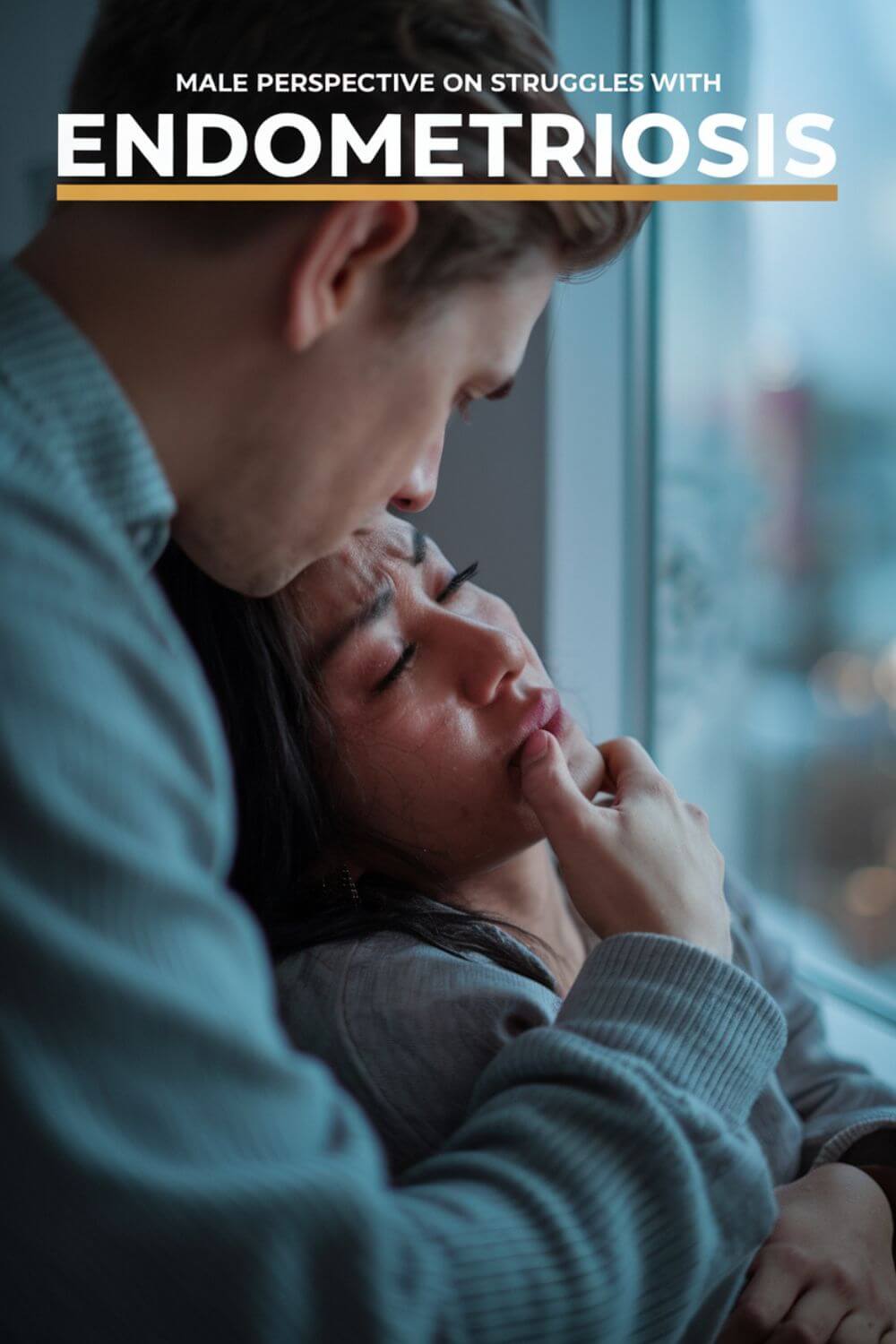Male Perspective on Endometriosis Struggles
Understanding endometriosis from a male point of view is crucial in acknowledging the struggles faced by men whose partners battle this condition. Often overlooked, the emotional and psychological impact on men cannot be underestimated.
As a man witnessing your partner’s endometriosis struggles, you may experience a range of emotions, from worry and anxiety to a sense of helplessness. It is important to recognize that your own well-being is also affected, and your perspective matters in the management and support of endometriosis.
By gaining a deeper understanding of endometriosis and its impact on your partner, you can provide the support and empathy needed to navigate this challenging journey together.
- Impact of Endometriosis on Men's Psychological Distress
- Sexual Challenges Faced by Men with Partners with Endometriosis
- Role of Men in Endometriosis Management and Support
- Impact of Endometriosis on Men's Social Support
- Strategies for Supporting Male Partners of Endometriosis Patients
- Promoting Emotional Well-being for Male Partners of Endometriosis Patients
- Creating a Supportive Environment for Men with Partners with Endometriosis
- Conclusion on Male Perspective on Endometriosis Struggles
- Source Links for Male Perspective on Endometriosis Struggles
Impact of Endometriosis on Men’s Psychological Distress
When it comes to endometriosis, the focus is often on women who are directly affected by the condition. However, it is important to recognize the impact that endometriosis can have on men, particularly their psychological well-being. Research has shown that men whose partners have endometriosis often experience increased levels of psychological distress.
Living with a partner who has endometriosis can evoke a range of emotions in men. They may feel worried, anxious, and even experience low mood or grief-like processes. Men may struggle to fully understand the impact of endometriosis on their partner’s life, and may also feel helpless in providing the support that their partners need.
It is crucial to acknowledge and address these emotional challenges faced by men. By recognizing and validating their feelings, men can be better equipped to cope with the impact that endometriosis has on both their relationships and their own well-being.
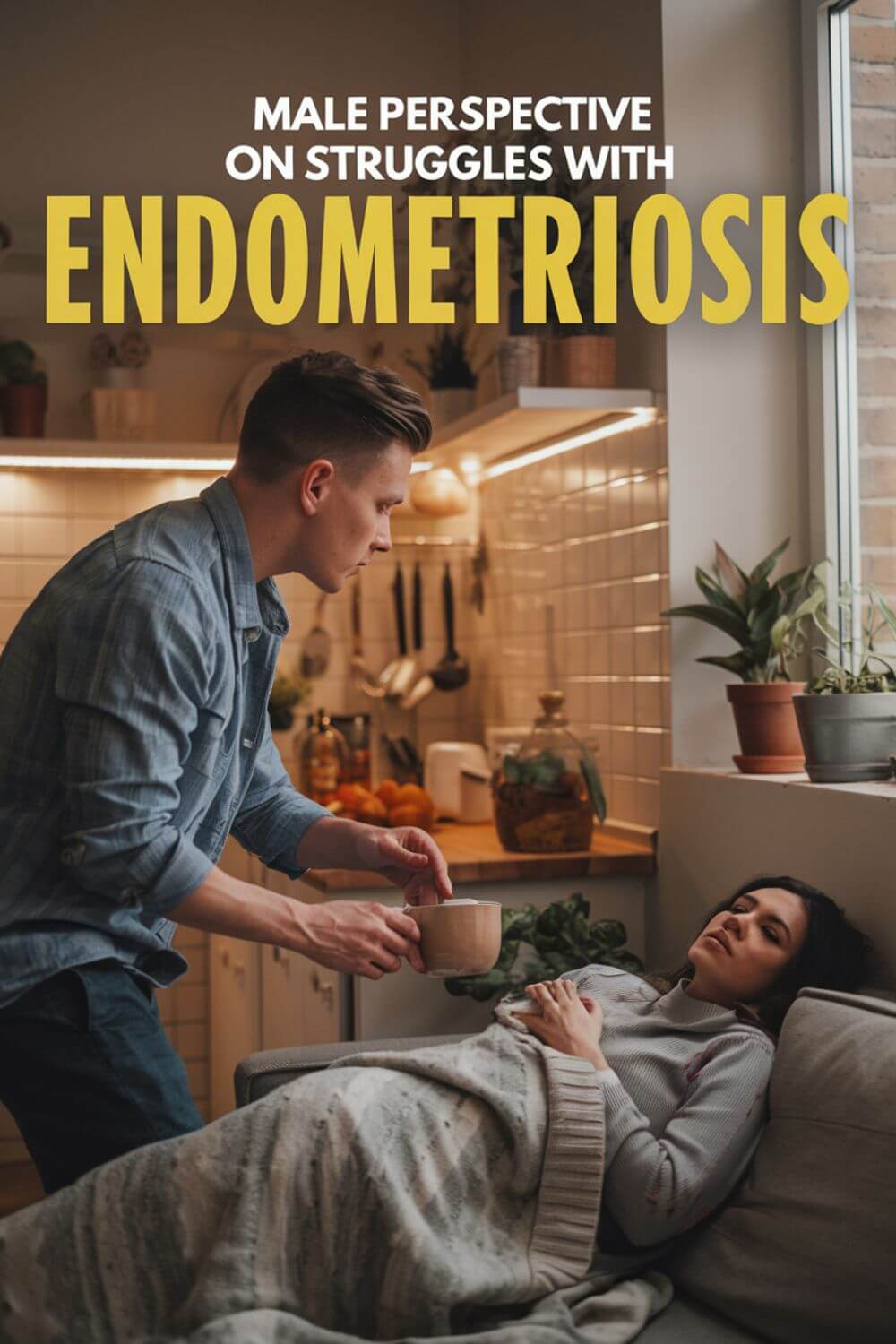
Sexual Challenges Faced by Men with Partners with Endometriosis
Endometriosis not only affects women physically but also has a significant impact on the sexual lives of couples. Men with partners who have endometriosis often face unique challenges in maintaining a healthy and fulfilling sexual relationship. The pain and discomfort experienced by their partners can lead to decreased sexual satisfaction and difficulties in intimate connections.
Men may find it challenging to initiate or engage in sexual activity due to their partners’ pain and discomfort during intercourse. This physical limitation can have a psychological impact, causing feelings of frustration, inadequacy, and even guilt. It is important to acknowledge these difficulties and provide support and understanding to maintain a healthy sexual relationship.
Creating open lines of communication and fostering an atmosphere of understanding and support can help couples navigate these sexual challenges. It is crucial for men to have conversations with their partners about their needs and limitations and explore alternative forms of intimacy and pleasure that can be enjoyed without causing pain or discomfort. Seeking guidance from healthcare professionals, such as gynecologists or sex therapists, may also provide helpful strategies and insights for managing these challenges.
By approaching these challenges together and providing emotional support and understanding, couples can maintain a fulfilling and satisfying sexual relationship, despite the limitations imposed by endometriosis.
| Challenges Faced by Men with Partners with Endometriosis | Impact |
|---|---|
| Decreased sexual satisfaction | Leads to strain on the relationship and dissatisfaction |
| Difficulties in initiating or maintaining sexual activity | Affects intimacy and emotional connection |
| Feelings of frustration, inadequacy, and guilt | Can lead to emotional distress and strain on the relationship |

Role of Men in Endometriosis Management and Support
Men play a vital role in supporting their partners who have endometriosis. By actively engaging in the management and support of this condition, men can contribute to better outcomes and improved quality of life for their partners. Here are some key ways in which men can make a difference:
- Provide emotional support: Men can offer understanding, empathy, and a listening ear to their partners. By being present and compassionate, they can help alleviate the emotional burden that often comes with endometriosis.
- Participate in treatment decisions: Men can actively engage in discussions with healthcare professionals and their partners to better understand the available treatment options. By providing input and support, they can help their partners make informed decisions about their care.
- Advocate for their partners’ needs: Men can be strong advocates for their partners when it comes to seeking appropriate medical care, accessing support resources, and raising awareness about endometriosis. By speaking up and taking action, they can ensure that their partners’ needs are met.
Furthermore, men can educate themselves about endometriosis to gain a better understanding of the condition and its impact. By learning about the symptoms, treatments, and challenges associated with endometriosis, men can provide better support and be better equipped to navigate the journey alongside their partners.
Creating a supportive environment is also essential. Men can foster open and honest communication within the relationship, allowing for the sharing of fears, concerns, and experiences related to endometriosis. By creating a safe space for their partners to express themselves, men can help cultivate understanding and strengthen the bond between them.
By actively participating in endometriosis management and providing support, men can make a significant difference in the lives of their partners. Their involvement and understanding can help alleviate the physical, emotional, and psychological challenges that often accompany endometriosis, promoting a healthier and more fulfilling life for both partners.
Impact of Endometriosis on Men’s Social Support
Men whose partners have endometriosis may face social and emotional challenges due to a lack of understanding from their social environment. They may feel isolated, misunderstood, and struggle to find support from friends and family who may not fully comprehend the impact of endometriosis. Providing social support to men in these situations is crucial to help alleviate their emotional burden and promote their well-being.
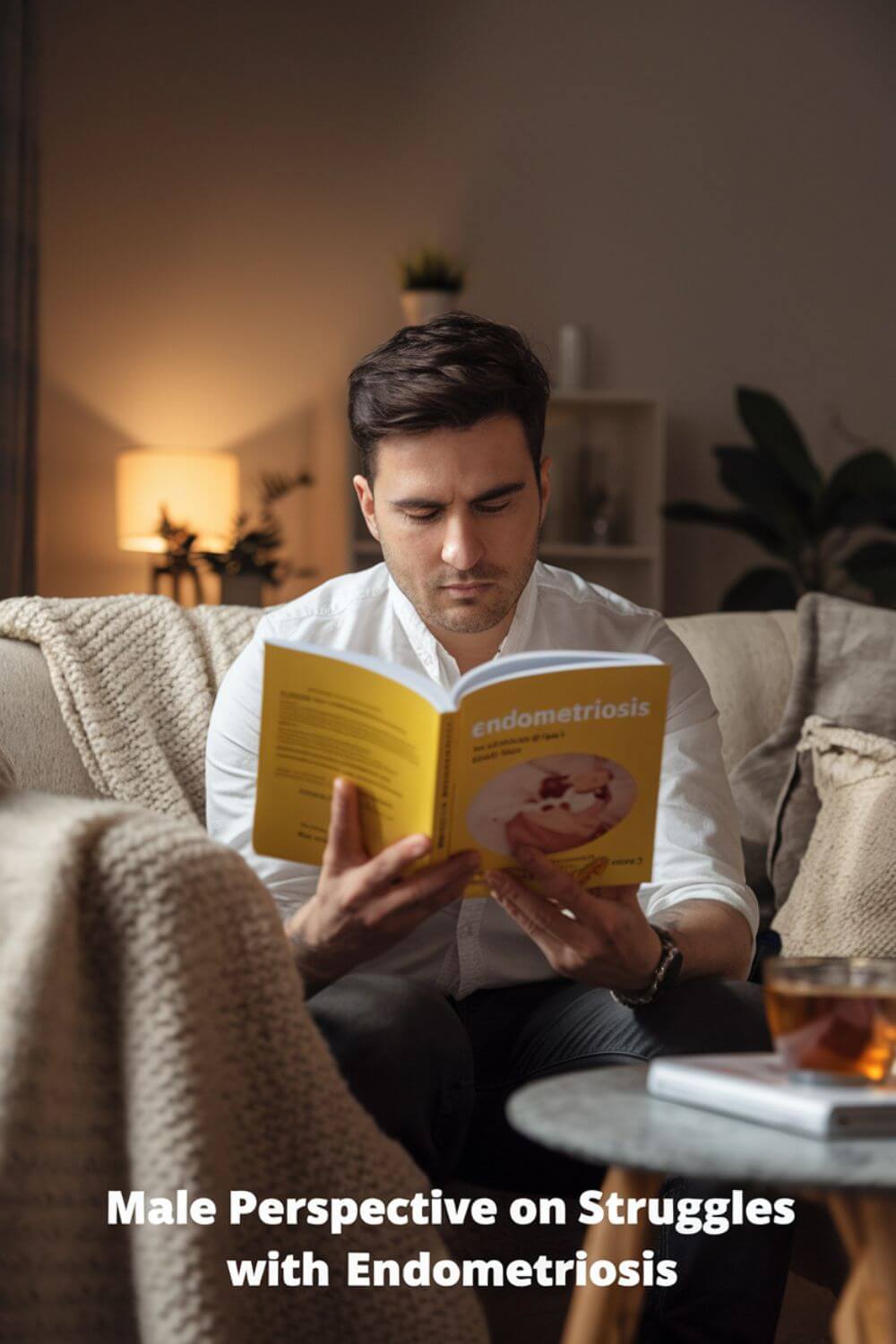
Impact of Endometriosis on Men’s Social Support
When men witness their partners experiencing the difficulties of endometriosis, they often find themselves in a position where their own needs for support and understanding are overlooked. Friends and family may struggle to grasp the impact of this condition, leading men to feel isolated and misunderstood. It is essential to acknowledge the importance of social support for men in these situations, as it plays a pivotal role in alleviating emotional burden and promoting overall well-being.
By addressing these challenges and providing the necessary support, we can create a more inclusive environment for men whose partners have endometriosis. This support system will enable men to share their experiences, emotions, and concerns without fear of judgment or dismissal. It is crucial to recognize the importance of men’s role in endometriosis management and to ensure that they receive the support they need to navigate this journey alongside their partners.
| Challenges Faced by Men | Supportive Actions |
|---|---|
| Lack of understanding from friends and family | Education and awareness about endometriosis |
| Feelings of isolation and being misunderstood | Creating safe spaces for open communication |
| Inadequate support network | Providing empathy and validation |
| Emotional burden | Encouraging participation in support groups |
Strategies for Supporting Male Partners of Endometriosis Patients
Supporting male partners of endometriosis patients is crucial in ensuring their emotional well-being and fostering a healthy relationship dynamic. Here are several strategies that can help provide the necessary support:
- Educate and raise awareness: It is important to educate men about endometriosis to help them better understand the condition and its impact. This can be done through pamphlets, online resources, or even attending support groups together.
- Encourage open communication: Creating a safe and non-judgmental space for men to express their feelings and concerns is essential. Encourage open communication and actively listen to their experiences without dismissing or minimizing their emotions.
- Provide emotional support: Male partners of endometriosis patients may experience a range of emotions, including frustration, helplessness, and anxiety. Show empathy and offer emotional support through active listening, validation, and reassurance.
- Engage in couples therapy: Couples therapy can provide a supportive environment where both partners can openly discuss their experiences and concerns. It can help improve communication, deepen understanding, and provide tools for navigating the challenges of endometriosis together.
- Join support groups: Support groups specifically for male partners of endometriosis patients can be a valuable resource. These groups offer a sense of community, shared experiences, and practical advice for coping with the challenges that arise.
Remember, supporting male partners of endometriosis patients is an ongoing process that requires patience, empathy, and understanding. By implementing these strategies, you can help create a supportive environment where men feel heard, validated, and empowered to navigate the complexities of endometriosis alongside their partners.
| Strategies for Supporting Male Partners of Endometriosis Patients |
|---|
| Educate and raise awareness |
| Encourage open communication |
| Provide emotional support |
| Engage in couples therapy |
| Join support groups |

Promoting Emotional Well-being for Male Partners of Endometriosis Patients
When it comes to coping with endometriosis as a man, it is crucial to prioritize your emotional well-being. Living with a partner who has endometriosis can be challenging, and it is important to take care of yourself in order to offer the best support possible. Here are some strategies to promote your emotional well-being:
- Practice self-care: Engage in activities that bring you joy and help you relax. This could include exercise, hobbies, or spending time with loved ones.
- Seek professional support: Consider reaching out to a therapist or counselor who specializes in supporting individuals in similar situations. They can provide guidance, coping strategies, and a safe space to express your feelings.
- Communicate openly: Foster open and honest communication with your partner about your emotions and concerns. Sharing your experiences can help both of you better understand and support each other.
By prioritizing your emotional well-being, you can enhance your ability to navigate the challenges of endometriosis alongside your partner. Remember, it is important to take care of yourself in order to be the best partner you can be.
Supportive Quotes from Men with Partners with Endometriosis
Remember, you are not alone in this journey. Many other men have faced similar challenges and have found ways to support their partners while taking care of themselves. Reach out for support when needed and remember to practice self-care. Together, you and your partner can navigate the complexities of endometriosis and build a stronger relationship.
| Quote | Author |
|---|---|
| “Being there for my partner and offering emotional support has been an important part of our journey with endometriosis.” | David S. |
| “Learning about endometriosis and the impact it has on my partner has helped me better understand her experiences and be a more supportive partner.” | Mark T. |
| “Taking care of my own emotional well-being has allowed me to be a stronger and more compassionate partner in our endometriosis journey.” | Adam G. |
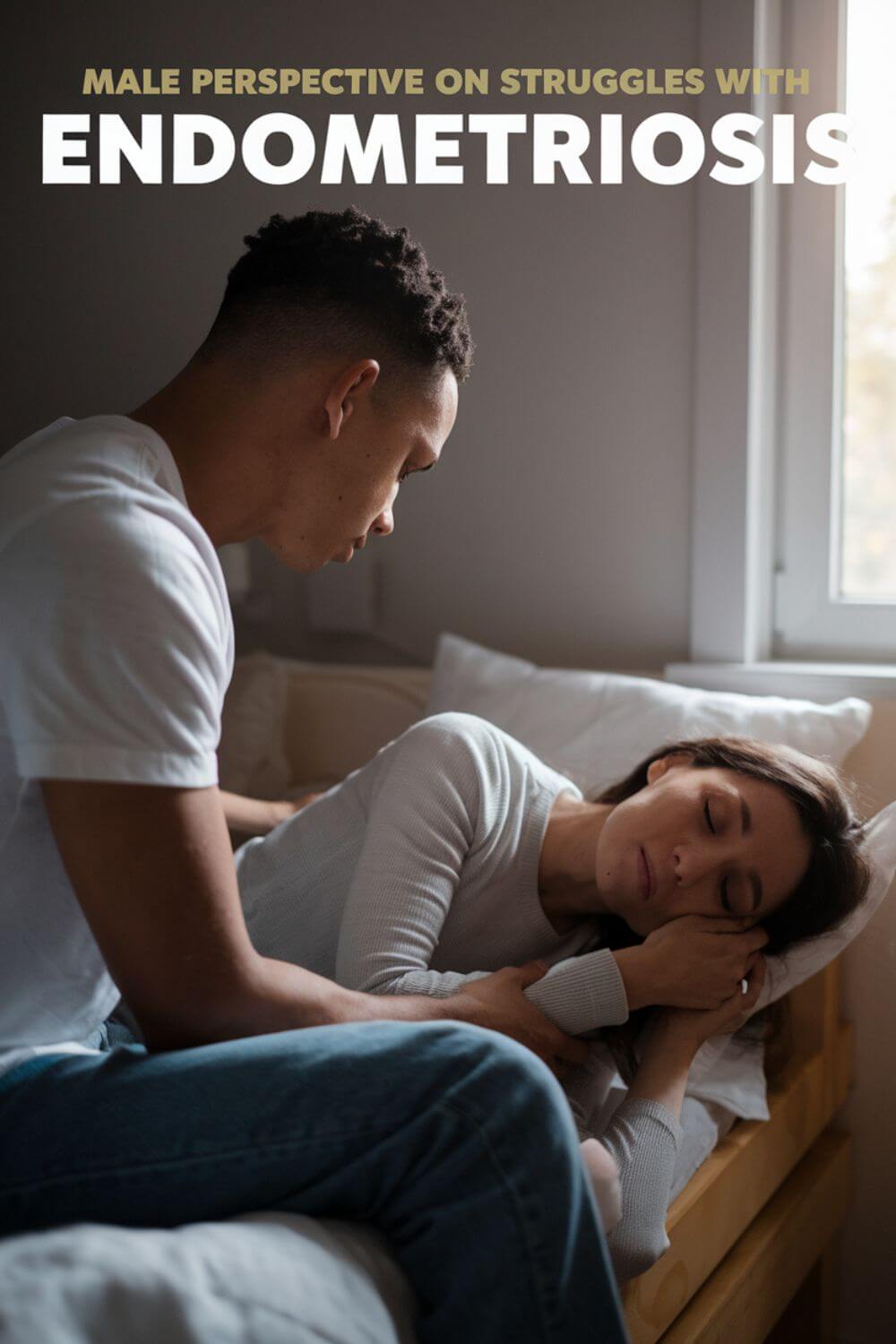
Creating a Supportive Environment for Men with Partners with Endometriosis
When it comes to endometriosis, it’s crucial to create a supportive environment for men who have partners with this condition. Understanding endometriosis from a male point of view is essential in order to provide the necessary empathy, validation, and support. By acknowledging the unique struggles faced by men and offering resources and information, we can foster a sense of understanding and inclusion.
One way to create a supportive environment is by providing education and awareness about endometriosis. Men may lack knowledge about this condition and its impact on their partners, so offering resources and information can help bridge that gap. By increasing men’s awareness of endometriosis, we can promote understanding and empathy.
Supportive Resources and Information
Another important aspect of creating a supportive environment is by offering resources and information specifically tailored to men. This can include brochures, websites, and support groups that address the unique experiences and challenges faced by men whose partners have endometriosis. By providing these resources, we can empower men to actively participate in their partners’ journey and feel more equipped to provide support.
Safe Spaces for Discussion
In addition to resources, creating safe spaces for men to discuss their experiences and emotions is crucial. Support groups specifically designed for men can provide a platform for open and honest conversations about the challenges they face as partners of individuals with endometriosis. By offering a safe space for discussion, men can find solace in knowing that they’re not alone in their experiences.
By fostering a supportive environment that includes education, resources, and safe spaces, we can empower men to better support their partners and enhance the overall quality of their relationship. Understanding endometriosis from a male perspective is key in providing the necessary support and validation needed for men whose partners have this condition.
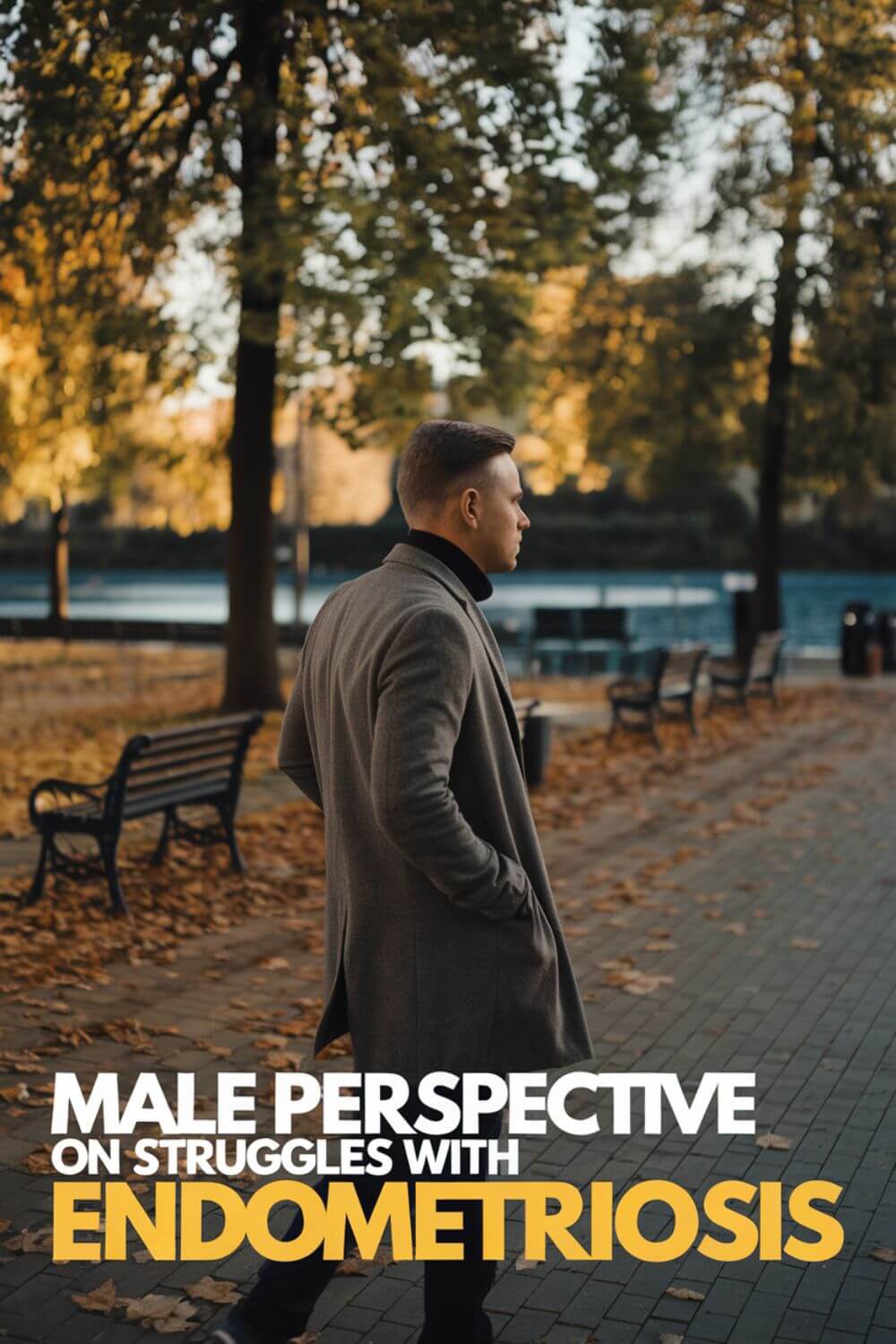
Conclusion on Male Perspective on Endometriosis Struggles
The male perspective on endometriosis struggles is often overlooked, but it is crucial to acknowledge the emotional and psychological challenges faced by men whose partners have this condition. Men experience a range of emotions including worry, anxiety, and grief-like processes when their partners are affected by endometriosis. They may also face difficulties in providing support and coping with the constancy of the disease. It is important to recognize and address these challenges to promote the well-being of both men and their partners.
By including men in the conversation about endometriosis and ensuring their experiences and needs are considered, we can better understand the condition from a male point of view. Providing support, creating a supportive environment, and offering resources and information to men can help them navigate the challenges of endometriosis alongside their partners. It is through empathy, validation, and understanding that we can enhance the overall quality of relationships impacted by endometriosis.
Understanding endometriosis from a male perspective is key to effective management and support. By recognizing the unique challenges faced by men and providing them with the necessary tools and resources, we can foster a stronger support system and improve the well-being of both men and their partners. Together, we can create a more inclusive and empathetic approach to endometriosis that encompasses the experiences and needs of all individuals affected by this condition.


About Me
Hi, I’m Lucjan! The reason why I decided to create this blog was my beautiful wife, who experienced a lot of pain in life, but also the lack of information about endometriosis and fibromyalgia for men…
